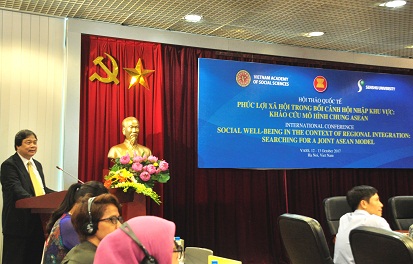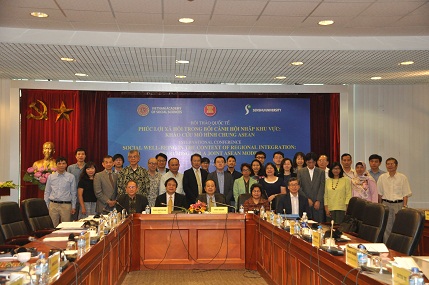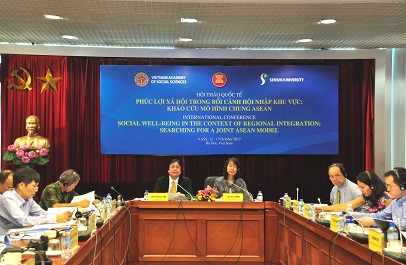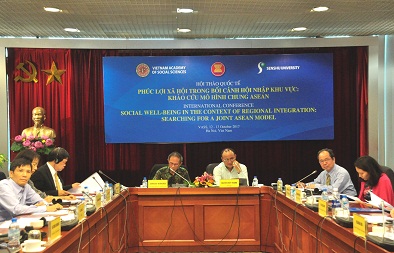Attending the workshop were Dang Nguyen Anh, Vice-President of the Academy and scientists, representative leaders and researchers from specialized institutes, research institutes, universities and scientific organizations in Hanoi.
 |
 |
On behalf of the Academy Leaders, in the opening speech at the workshop, Vice-President Dang Nguyen Anh warmly welcomed the large participation of international and domestic delegates, affirmed the meaning and importance of the workshop to study, explore the similar aspects of social welfare in ASEAN countries in the context of regional integration and connectivity. Vice-President also valued the important role of the research cooperation network between Senshu University and the universities and research institutes in East Asia and Southeast Asia. At this workshop, the presentations used a quantitative analysis methodology to initially identify the patterns and components of social welfare that ASEAN countries should study and jointly build. Mr. Dang Nguyen Anh emphasized that this is one of the directions that the Institute has focused over the years to combine the objectives of social justice, social security and human security towards the goal of sustainable development that the international community is making.
The workshop had 9 presentations, divided into 3 sessions:
The first session: Regional Integration and Social Welfare of ASEAN with Prof. Dr. Surichai Wun'gaeo and Dr. Surangrut Jumnianpol, Chulalongkorn University, Thailand (The determinants of social welfare: Case study in Thailand); Prof. Iwanati Pattoniarana, Lidya Triana Aly, Roy Ferdy, Gunawan, Tiara Wahyuningtyas and Rangga Ardan Rahim, University of Indonesia (Socio-Economic Development in ASEAN: Comparative Analysis of Countries Indonesia, Malaysia, Thailand, Philippines and Vietnam); Assoc.Prof.Dr. Dang Nguyen Anh, Academy (Strengthening social welfare policy for development in ASEAN countries). The contents provided a clear picture of the situation of socio-economic integration and welfare issues in the ASEAN region.
 |
 |
The second session: Models of ASEAN integration and development with the participation of Prof.Dr. Juichi Inada, Senshu University, Japan (Impact of Chinese Aid on Development Models: The Case of Cambodia and Implications for ASEAN); Dr. Le Kim Sa, deputy director of the Center for Analysis and Forecasting, Academy of Arts (Development and Integration of ASEAN with the Revelation of China); Dr. Makka Linuma, Senshu University, Japan (CLMV Development Cooperation: Regional Integration and Equitable Development) focused on identifying and analyzing the role of socio-economic development investment. China and the great impact on the development and integration of ASEAN countries.
The third session: Social change in Southeast Asia and East Asia in the presence of Prof. Shusuke Murakami, Senshu University, Japan (Changing views on Vietnam's development in Japanese society); Prof. Francisia SSE Seda, University of Indonesia (Social Policy, Social Exclusion and Social Welfare in Southeast Asia: Indonesian School Research); Prof. Katsumi Shimane and Prof. Masayuki Kanai, Senshu University, Japan (Ancestors worship and welfare from the assessment: Comparison between East Asian and Southeast Asian countries). The content of the presentation examined the issue of social welfare from a spiritual perspective and traditional cultural activities.
Along with the presentations, the conference heard a lot of ideas and discussion. Scientists are particularly concerned about the "Beijing consensus" in the ASEAN-China cooperation relationship and reaffirms that countries need to build a farther perspective on this cooperation, beyond each country's interests if you want to get the consensus among ASEAN countries on the issue of China. In addition, scientists have raised a number of issues such as the degree of autonomy of a country in the aid-receiving relationship; What are the policies to redistribute income in the ASEAN region?...

Conference Overview
The analysis and assessment of the scientists helped to identify more comprehensively the difficulties and challenges of ASEAN in the process of building the social welfare model. ASEAN needs to shift the model of access, build the society on the principle of "people-centered", development by human and for human. "To build a common welfare model, scientists in each country can not ignore the development of a" social-wellbeing "set of indicators. This is a set of indicators needed to quantify the level of social welfare development and social development that can be applied to the whole of ASEAN.
The seminar "Social Welfare in the context of regional integration: ASEAN Model Survey" was a success. The workshop is a useful scientific forum for researchers, scientists to share information, materials, views and views on social welfare in ASEAN in the new context; At the same time, suggestions for useful solutions for the next workshop will be held in Yogyakarta, Indonesia in early 2018.
Hong Nhung







